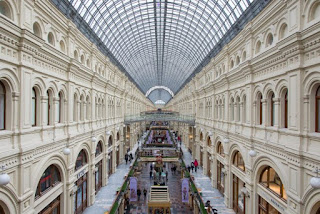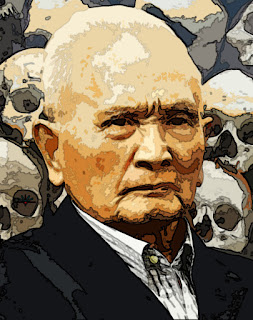This week I find myself in
the cosy confines of the local Conservative club in Thetford town
centre. Like most such places, it is not really political in any
sense that most would understand as political, and certainly the
clientèle are a very mixed bunch indeed, seemingly of all
affiliations and persuasions. What is very pleasant is that the place
is cosy and rather warm. Outside it is the last day of April and the
temperature is 4C with a wind chill factor that makes it feel more
like zero. Also, they do a decent cup of coffee for a very
generous £1.05.
As it has been a few weeks since my last flaneurial blog I felt it was time that I actually sat in front of the oddly intimidating keyboard once more and created something of a counterbalance to my observations of life in the US. Many, many moons ago now, when I was a relatively young and carefree flaneur, I also had the good fortune to visit several countries behind what used to be known as the Iron Curtain. The first taste of life on the other side was Bulgaria; it proved pleasant enough but the realisation that although myself and my travelling companion readily acquired large amounts of the local currency, those Lev were incredible difficult to actually get rid of. Beyond a few random leather goods there was literally nothing of any value or interest to purchase. The best that could be said of the shops was that they were functional...just. In the city of Varna on the Black Sea there seemed to be little or nothing occurring whatsoever.
Before we left for Bulgaria we were assured by the Bulgarian tourist agency that we could enjoy a rate of exchange 1.5 times the norm. This we naturally took advantage of, only to find on arrival
As it has been a few weeks since my last flaneurial blog I felt it was time that I actually sat in front of the oddly intimidating keyboard once more and created something of a counterbalance to my observations of life in the US. Many, many moons ago now, when I was a relatively young and carefree flaneur, I also had the good fortune to visit several countries behind what used to be known as the Iron Curtain. The first taste of life on the other side was Bulgaria; it proved pleasant enough but the realisation that although myself and my travelling companion readily acquired large amounts of the local currency, those Lev were incredible difficult to actually get rid of. Beyond a few random leather goods there was literally nothing of any value or interest to purchase. The best that could be said of the shops was that they were functional...just. In the city of Varna on the Black Sea there seemed to be little or nothing occurring whatsoever.
Before we left for Bulgaria we were assured by the Bulgarian tourist agency that we could enjoy a rate of exchange 1.5 times the norm. This we naturally took advantage of, only to find on arrival
A couple of years later I
actually found myself on a tour of the Soviet Union itself. I believe
Cernenko was in power at the time, one of a series of leaders so old
that no sooner had they assumed the reigns of the Supreme Soviet than
they promptly dropped dead. In some ways it was symbolic of the
system itself; even to my inexperienced eye it was clear that it was
dying on its feet.
The first city we visited
was Moscow. By this stage of my life I already had a fair amount of
travelling experience and had been to about 25 capital cities
previously. Moscow was far and away the most boring, lifeless and
oppressive place I had ever been to in my life. Dour, cowered people,
shortages almost everywhere and a general feeling of alienation, a
society ill at ease with itself.
I had been told to visit
GUM, Moscow's equivalent to Harrods according to our guide. On
arriving there I found a dingy three storey building just off of Red
Square. The goods were incredibly shoddy, but when a shipment of
shoes arrived at one of the departments people were almost fighting
each other to get in first. Looking at said shoes I found them to be
of poor quality and style, little more than utilitarian at best.
Red Square proved a little
challenging in its own right. Down the centre there were lines marked
on the road that indicated where the official cars could drive into
the Kremlin. It had a small zebra crossing about 80 metres from the
gate. As there were no cars in sight, just tourists milling around, I
started to cross over the painted lines only to be greeted with the
sound of a shrill whistle. I looked around and saw a policeman in a
rather impressive fur hat blowing furiously in my direction. I
gestured to him indicating that there was nothing to be concerned
about, not a vehicle anywhere to be seen, but his response was to put
his hand upon his gun holster and indicate that I was only to cross
at the designated crossing. As the days went by in Russia, I was to
discover this strict adherence to such petty rules was all part of
the apparatus in the Soviet Union of the time.
A few days later we flew
down to Tbilisi in Georgia in an ancient Tupolev tu-154. From a
height of 35,000 feet we looked down on an endless expanse of wheat
as far as the eye could see on both sides of the aircraft. Oddly
though, very few roads were visible. I had read before heading out on
the trip that yet again that year the USSR had been forced to buy
huge amounts of wheat from the US because of a shortage at home. I
could not help but wonder exactly what kind of economic system could
so badly mismanage its obvious and plentiful resources.
After about an hour I felt
the call of nature. Looking back down the aircraft I noticed that the
toilets at the rear were already occupied so I headed towards the
front of the plane. About three quarters of the way along the cabin
was split by a red velvet curtain. Pulling this back I was quite
surprised to see several rows of very large and cosy seats, a
well-stuffed magazine rack, tinkling drinks trolley and four or five
flunkies. Quickly, our courier jumped up and snatched the curtain
from my hand. Surprised, I asked her the obvious question:
“I thought there was no
first class on Russia planes?”
She responded:
“It's not first class,
it's for party members!”
Kinda said it all
really...
The city of Tbilisi in
Georgia was, at the time, part of an early experiment that the Soviet
government were running in allowing the local farmers and
manufacturers to simply sell their produce and goods without
government interference. The experiment had been going for about a
year but the effect was like chalk and cheese in comparison to
Moscow. Fresh and healthy produce in abundance everywhere and a
wonderfully vibrant atmosphere to the city in complete contrast to
the utter deadness of Moscow.
Up to that stage of my
life I had been very much a man of the left. As a child I had admired
the likes of Che Guevera and Fidel Castro, and loved all things to do
with the old USSR. My father had been a strong union man and that
attitude had very much affected me as a boy. Now though, seeing the
reality of life in the Soviet Union, the cold hand of centralised
control, the repressive regime, the general dowdiness of everything
from the flats to the clothes, the poorly designed cars and austere
metro sans advertising except for the glories of the Communist Party,
it was slowly beginning to dawn on me just how awful applied
Socialism actually was in practice.
I went from the joys of
Tbilisi, with its limited market reforms, back into Russia at Sochi.
The location was pleasant enough but it became very noticeable that
those of us who dared to venture out on our own had company whether
we liked it or not. Often that company was 50 yards or so away but
you couldn't help but notice the same faces kept turning up again and
again. My courier was almost pleading with me at one stage to stay
with the group. At a guess, she herself was probably under some
pressure for losing control of her Western charges.
The trip ended in
Leningrad (renamed St Petersburg once again now). Although a much
more beautiful city than Moscow, with some gorgeous architecture, it
still suffered from the same paranoia. I had spent a few weeks
learning some basic Russian before I left but found that people were
very unwilling to be seen spending any time at all with any of the
group. Eventually, in a café cum bar in central Leningrad, I did
manage a short conversation with a somewhat drunk middle aged man. He
confirmed what had been my suspicion. Just being seen with the likes
of a Western tourist could mean trouble for you or your family, so
the wise thing was to look the other way and pretend that you had
heard and seen nothing.
Hmm, this piece seems to
be running on a lot longer than intended, yet it feels as if I have
left so much of these experiences out. Suffice it to say that within
those few weeks in the old Soviet Union the first seeds of doubt were
sown. I had started the trip really quite naive about the nature of
such collective systems. When I set out it had seemed clear to a
young and idealistic traveller where the political future should lie.
In that sense it was something of a coming of age, of the realisation
that all was not right in the Socialist garden. At the time I had no
idea why; the answer to that was to take another two decades, but the
first inklings of the underlying reality were beginning to be
realised.
Back in the Conservative
club life goes on much as it ever did, that comfortable continuity
that seems so complacent yet is the very glue that holds a society
together. We all imagine as youngsters, much as I did, that what is
needed is the bold, the new, the iconoclastic, but the reality is
that much of what makes a tolerable society is in the institutions,
habits and attitudes of a people. Those deep cultural roots that make
Europe and its culture such a beacon to the World. The historian
Michael Woods put it beautifully when he spoke of 'The habit of
civilisation'.




































